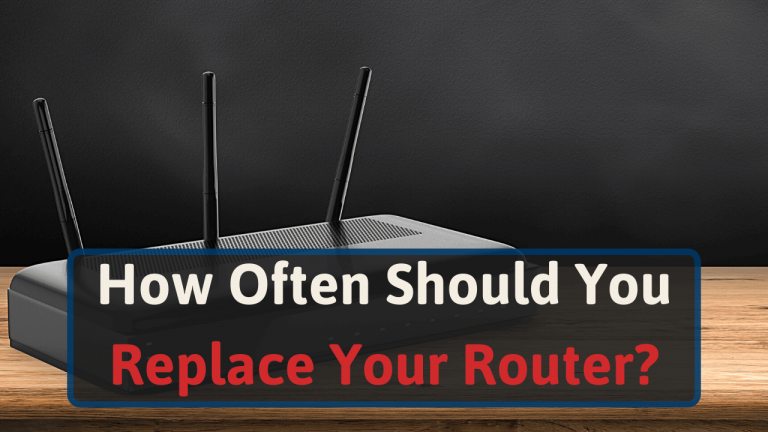Knowing when to call it quits and buy a new router can be hard, but as a Network Engineer, I will help you decide if you need a new router or not.
In this article, I’ll help you learn how to troubleshoot your router first to see if you can solve the issue without a replacement.
Then, I’ll help you identify situations where it’s best to throw in the towel and simply buy an updated model. So you know exactly what to do and when.
Let’s get started.
When to Replace Your Router
Here are an expanded version of the three points above:
#1 Doesn’t give you the internet speed you’re paying for
If you pay for internet speed, you want to be able to take advantage of it. And your router might be the bottleneck.
For example, if you are paying for a Gigabit plan, but have a 4-year-old Wi-Fi 5 router, then you will not be able to take advantage of the plan you are paying for.
Suppose that is the case, I would recommend upgrading it.
But how do you know if your router is too slow?
The best way I know is to connect to the 5 GHz band and do a speed test right next to your router with your newest device.
You need to connect to the 5 GHz band because it’s the fastest band. I have never gotten more than 300 Mbps from the 2.4 GHz band on any router. In contrast, the 5 GHz band can reach upward of 1000 Mbps.
And you should use your newest device to make sure it isn’t the device that is the bottleneck because an old device might only support an old Wi-Fi standard. Making the speed you get slow no matter what router you have.
After you have done a speed test, compare it to the internet plan you are paying for.
It doesn’t have to match perfectly, but it should be somewhere in the ballpark of it. At most, around take 300 Mbps less than your plan.
You should consider getting a better router if it’s more than ~400 Mbps off. Just note that this isn’t a perfect method, but the best easy one I know of.
#2 Can’t handle all your devices
Your router is likely the fault if you have a constant dropping connection.
Most often, this is because of too many devices connected to the router. Something that is more on more common as more smart devices start entering our homes.
If you have tons of smart devices, I recommend getting a tri-band router. That extra 5 GHz band help a lot.
#3 Gives you any other problems that simple troubleshooting can’t fix
I have had hundreds of problems with routers throughout my life, and I simply can’t go over everyone here.
But if you have any other problems that the troubleshooting below can’t solve, then your best bet is most likely to get a new router.
Troubleshooting Router Problems Before Replacement
Here are some Wi-Fi router troubleshooting tips that you should do before buying a new router.
#1 Unplug the Router and Modem
The first and easiest thing to do is simply unplug and plug the router back in.
Do the same with your modem, as the problem could stem from that device rather than the router.
While it seems incredibly simple (and it is), it can solve many issues by resetting the interface between the operating system and the radio receiving the internet signals.
#2 Run a Speed Test
Another option is running speed tests to see if the issue is just a weak signal in a part of your home. These are free tests you can find online to help.
If you think it may have to do with your computer, place it in your home or where the router is. Try moving it to a different location and see if that solves the issue.
#3 Bypass Your Router
You could also try bypassing the router and plugging your computer straight into the modem using an ethernet cable.
If your speeds are faster, you know your router is the culprit, if they are the same, the problem might be your modem.
#4 Update Your Router’s Firmware
Your router may need a firmware update. To check that, access your router’s admin panel and update it.
I recommend leaving automatic updates on for the best performance. Learn how to access your router here.
#5 Reset Your Router
If none of these troubleshooting tips work, you can reset your router as a last resort. You can do that by pressing the little hidden button on the back of the router for 5-10 seconds.
This will, however, reset all the custom settings you have done for your router and make it forget all of your devices connected to it.
If you notice a major performance improvement, that’s a sign that your router isn’t cutting it for you, and it’s time to get a new one.
Other Signs You Need to Replace Your Router
How often should you replace your router? Well, if the above tips aren’t working to solve your problem, there’s a good chance it’s time to upgrade to a new router.
Just to make things easier, if you’re noticing any of the below issues, take that as your sign to go ahead and replace your router.
#1 You’re Lagging Behind
If you’re lagging in technology, you’re only going to fall further behind as technology evolves rapidly.
It’s important to stay updated on the latest upgrades and updates. For example, new routers often have 2GHz and 5GHz capabilities, letting you access the internet from either.
#2 You Can’t Keep a Connection
If your connection drops and you have to unplug and re-plug your router daily or every few days, don’t stay frustrated. Get a new router and find relief.
A new router has a greater capacity to handle several devices at once, so you won’t continue experiencing dropped connections.
#3 Overheating Constantly
Routers can work up a moderate level of heat. But if they get too hot, they will start having problems. Thus, it’s important to keep space around them so the air can properly vent.
If you’re leaving room to vent, but your router keeps overheating and hence, turning off, it’s a sign that it’s weathered too much wear and tear. You should call it a day and get a new one.
#4 Upgrades Calling
If you want more flexibility through third-party firmware upgrades. You might need to start with a new router that allows for these capabilities.
Older routers are less likely to work with third-party firmware, but newer routers with DD-WRT can offer you better options. [1]
#5 Unmet Need for Speed
If you’re watching videos on Youtube or streaming Netflix and getting frustrated by the additional load times and lagging speed. You might need to upgrade to a better router.
It’s okay to accept that a router speed that was just fine a few years ago is no longer providing what you need. So move on, and find one that can give you the throughput you’re looking for. [2]
Just note that your router will never give you faster throughput than what you pay your ISP for.
#6 Status Lights Not Performing
If the status lights on your router that indicate power and internet connection aren’t lighting up. This is a sign that your router isn’t functioning as it should.
Trying to repair an issue like this can cost you more in the long run, so you may save money just by getting a new one.
#7 Continued Failure to Launch
If your router fails to start repeatedly, these are likely the beginnings of the problems you’ll face.
These devices aren’t meant to last forever. When they show these signs of degradation and slowing down, lean into it and buy yourself a new one that will last.
What About a Modem/Router Combo?
The guidelines to replace your modem/router combo are the same as a router.
Replace it when you start to see issues with its speed, amount of devices you can connect, or other problems you cannot resolve with troubleshooting.
What about the modem?
Replacing your modem is also the same recommendation as a router. However, they typically last longer than routers. Read our guide on how long modems last for more info.
And, if you need to upgrade yours, here are our recommendations for the best modems.
Final Thoughts – When to Replace Your Router
When you ask, “How often should you replace your router?” the simple answer is that you should replace it every three to four years.
However, a more thorough answer is to replace it when it:
- Can no longer keep up with the Internet speed your ISP provides
- Can’t handle all your wireless devices
- Has other issues you can’t fix.
If you notice one or more of these, ditch the 3-4 year recommendation and upgrade to a new router, no matter how long you’ve had it.
Also, check if the router still has a warranty, as routers usually have between one to three years.
If you’re ready for an upgrade, check out the best routers here.







